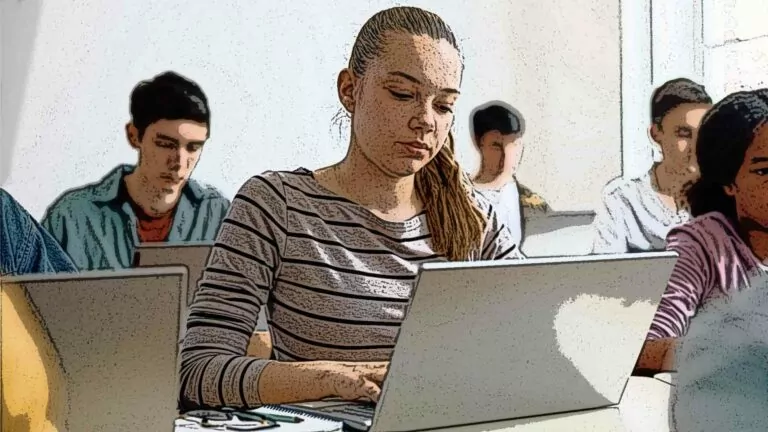With great technological innovation comes great responsibility.
In an era where the digital landscape transforms the way we live, learn, and connect, Reformed Christian schools stand at the intersection, navigating the delicate balance between embracing innovation and upholding their Bible-based values. The integration of various technologies – whether computers, YouTube videos, cell phones, iPads, or the hot-button topic of Artificial Intelligence (AI) – is forcing a profound question upon Reformed Christian education: How can we ensure that the transformative potential of technology aligns with and honors our Christian worldview? Are these tools mere distractions, pulling our focus away from the godly values our schools want to foster, or can these technologies be harnessed to deepen the connection between students and their Christian identity?
As the debate rages on between an impulse to retreat from technology entirely and the temptation to embrace it wholeheartedly, Reformed Christians have some complex decisions to make about how we will use technology in our classrooms.
Survey says
To try to get an understanding of what’s happening in Reformed schools across Canada, I asked 20 of them to participate in a survey exploring their approaches to screen time, technology policies, and the broader digital landscape within their educational environments. The participating schools ranged from elementary to high school and consisted of Canadian Reformed, United Reformed, and confessionally Reformed (but not associated with a specific church) schools. Of the contacted schools, 12 schools responded.
Questions ranged from yes or no questions to also allowing principals and school administrators to expand their answers in anonymous anecdotes. I also spoke with school principals who were willing to share more about their experiences.
Among our survey respondents, the majority (92%) have specific policies regarding the use of technology in the classroom or on school property. It’s encouraging to know that most schools are recognizing a need to regulate the technology being used on campus. Most schools had guidelines for “Computer Usage Policy” for devices owned by the school as well as an “Acceptable use of personal devices policy.”
One school said no phones at all
Marc Slingerland is the principal at Calvin Christian School, a K-12 school in Coalhurst, Alberta. Slingerland said that his school has tried a few approaches with different rules for personal devices in different grade levels. Across the board, they had a no-phone policy, “no phones allowed to be seen or in class.” However, they found that for older students in grades 11 and 12, some parents felt more comfortable with them bringing phones to school knowing that they would be driving to the campus. Taking this into consideration, the policy was changed to allow for grades 11 and 12 to use phones during breaks in the foyer. The hardest part was that this became a long haul of policing students – Slingerland says they have now reverted to the original plan.
“There’s a set time and a set place at which it’s allowed. It’s constantly policing the boundaries and if they’re just going to the locker to get a book, they can easily quickly just check it. So, we actually went back. This is now our second year with no student devices on school property at all.”
When to introduce?
When it came to the introduction of school computer labs or school iPads into classrooms, the prevalent sentiment was that the early stages of a student’s development may be better navigated without the intrusion of technology.
Paul Wagenaar is the principal at Jordan Christian School, a K-12 school in Lincoln, Ontario. When it comes to the younger grades, Wagenaar says that it’s rare for their school to introduce digital tech to students under grade 5.
“We intentionally keep technology out of the classroom in the early years as much as possible. The extent of the technology would be that each classroom does have a projector. Once in a while, there will be a video or something that will be shown to the students. But no use of iPads, or any electronic device in our classrooms up until grade four.”
Regarding the survey, most schools (with elementary-aged students) said that it’s between grade 3 and grade 5, that they start introducing technology like computers or laptops. “The exposure to technology in younger grades is limited to the teacher’s laptop and projector,” one principal said.
Benefits in older grades
When it comes to older grades (grades 8 to 12), some schools pair each student with their own iPad or laptop just for their own personal use. This type of “1-to-1” approach aims to enhance the educational experience by embedding technology into the curriculum. This allows teachers to foster personalized learning, and prepare students for the digital demands of the modern world.
Jordan Christian School has taken this approach in their high school. Their principal shared that each student has an Edsbee account, which is a web-based K-12 learning platform for teachers to upload assignments, and mark grades and attendance. The teacher will then enforce when the laptops should stay closed during lessons, and when the laptops can be used. Wagenaar says that he has found this useful in preparing students for post-secondary endeavors.
“We feel that they need to be prepared for the world in which they live as well. So I think the benefit of students having their own device is that in those four years, they really learn it well, and they’re well prepared for college or university or the workforce.”
While some schools take the 1-to-1 approach, others opt for the use of computer labs or Chromebook carts.
“The portable laptop cart has made student access to and use of technology much more convenient, with more opportunity than a standalone computer lab,” said one principal.
In terms of technology tools deemed helpful, the respondents highlighted a variety of platforms and applications such as Kahoot, Google Classroom, Google Docs, and educational apps like IXL and Scratch Jr.
Conversely, some tools, like YouTube, were identified as unhelpful due to potential distractions and inappropriate content. Interestingly, 75% of schools also said they have dealt with emerging technologies like AI in the classroom, including instances of students using AI to complete homework assignments.
Filters and firewalls
A large challenge in having digital devices in classrooms is the ability to monitor students, and keep them from getting into trouble online. All schools said that they use online security safeguards and firewalls to protect students from inappropriate websites and distractions (i.e., computer games). For many schools, it’s up to the teacher to enforce policies on how to use digital devices in class. Some principals voiced that they turn the screens on an angle so that the teacher can see what’s happening on the screen.
One survey respondent mentioned that they use an app called “GAT Shield” which gives teachers access to see all of their students on their own devices.
“Teachers can also lock webpages, close tabs, push websites, and send out individual or class-wide messages. Additionally, we have filters set up using some of their presets and our own to flag explicit material, inappropriate language, violent images – weapons, etc.,” this respondent noted. “When a student has tried to access this material, it sends a link/screenshot to the teacher and account administrator’s emails.”
In some of the specific policy guidelines, if students use devices in a way that violates school policy it can lead to the device’s confiscation for a period of time.
Years of research
With firewalls in place blocking video and audio streaming apps like YouTube and Spotify, it can help to combat distractions – yet distractions to videos or inappropriate online content are not the only things Christian classrooms should be aware of.
In 2020, researchers and professors David I. Smith, Kara Sevensma, Marjorie Terpstra, and Steven McMullen put together a three-year study on the use of technology in Christian schools titled Digital Life Together: The Challenge of Technology for Christian Schools. This comprehensive study relied on a variety of research methods from documentary video, interviews with students, staff, and teachers, as well as focus groups. Two of the authors, Marjorie Terpstra and David Smith, are researchers at Calvin University’s education department. Something notable they found in their research was students’ openness to talk about their online shopping habits during class. Smith noted:
“The most common form of distraction was going shopping. It wasn’t playing games. It wasn’t social media because that was mostly filtered out by the school. It’s really quite a recent thing.”
He mentions that distractions have always been a thing with or without technology in the class. Whether it’s passing paper notes or a student hiding the book he’s reading under his desk, it’s not a new phenomenon. But, online shopping in class is something all too new. During one of the student interviews for the book, Smith mentions a student who was proactively open with her shopping habits… in Bible class. She shared:
“It’s great because in Bible class, you can take notes faster and you can get the assignments written faster, and then while the teacher’s talking, you’ve got time to go shopping.”
Smith says that parents and educators need to be aware of this online shopping phenomenon because this consumerism mindset is often something that is tossed under the rug:
“Access to sexual material online, access to the wrong views about sex, some worry about cyberbullying and violence and violent material and so on. Very little worry about shopping, right? Because that’s not something that the Western middle-class Christians worry about very much, we’re as gung ho about that as everybody else.”
Smith says that as Christians, we need to be counter-cultural in not succumbing to the world’s ideas of “spending time lusting after consumer goods.” Parents and teachers need to change their mindset to acknowledge these discrepancies by teaching students to be discerning with their online habits.
Christian education should be designed to equip students for the real world
Overall, in conducting this survey with Reformed schools it’s evident that technology in the class is something that we cannot run from. Instead we should be teaching students to use it well. Terpstra alludes to an important truth, that Christian education is an opportunity for students to grow in community with one another, learning how to live and make choices.
“They get to enact their faith right now. It’s not like you are in school so that someday when you grow up, you can enact your faith, but technology and other choices that we can make can help them to be Christians right now.”












